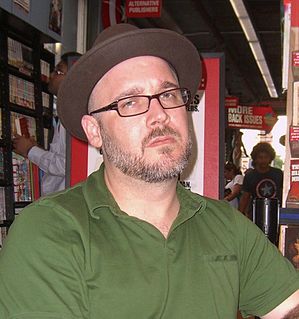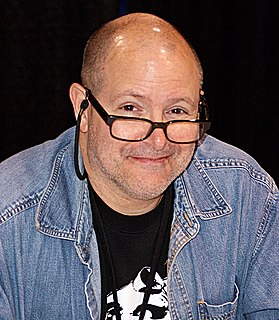A Quote by Neil Gaiman
I was a voracious reader and I could never understand why comics were of any less merit or importance than any other way of writing. I think the thing that keeps me with comics is there's still so much to be done. There's still this huge unplowed field, this huge unexplored wilderness, and as long as I can keep doing new things and coming up with new things, I will.
Related Quotes
With comics, you can only really learn what you're doing wrong or what works best when you see your work published. I've been publishing comics since my 20s, and still, when I flip through any of my new comics, I still only see the things that I wish I'd done better. But that's how you learn, by seeing it.
I never feel there's anything I can't do with comics. There are certain things in comics that you can't do in any other medium: for instance, in Mister Wonderful, Marshall's narration overlaps the events as they're going on. That would be difficult in film; you could blot speech out with a voiceover, but it wouldn't have the same effect. That's always of interest, to see what new things you can do in comics form.
When I was a kid, back in the '40s, I was a voracious comic book reader. And at that time, there was a lot of patriotism in the comics. They were called things like 'All-American Comics' or 'Star-Spangled Comics' or things like that. I decided to do a logo that was a parody of those comics, with 'American' as the first word.
Surely comics require more effort on the part of the reader than movies or television. I'm always learning new things you can do with comics that wouldn't work in any other medium, and often they require the need to process a lot of dense information. Of course, the trick is to make the complicated seem effortless and spontaneous.
The lovely thing about writing comics for so many years is that comics is a medium that is mistaken for a genre. It's not that there are not genres within comics, but because comics tend to be regarded as a genre in itself, content becomes secondary; as long as I was doing a comic, people would pick it up.
I don't really have any great interest in writing for movies. Comics, to me, is a much more promising field. There's still a lot of ground to be broken in comics, whereas movies, to a degree... I don't know. They're a wonderful art form, but they're not my favorite art form. They might not even be in the top five of my favorite art forms.
The good part of what comics trains you to do is it trains you - especially if you've worked in mainstream comics like Marvel and DC, or if you're just doing your own independent comics - to compartmentalize things and work on multiple things at the same time. And that's a skill that is incredibly handy in Hollywood, because within the first year that you get here, you realize there's a reason why every successful person in Hollywood has like seven or eight projects up in the air at any point.
It's the fact that fans still care. I like all the comics conventions: The smaller ones are easier, the bigger ones are exciting.... Each one I say: Never again. But they're all great.... These things are important because they keep the fans' interest alive in comics. They keep the fans reading and their imaginations stimulated.
I had done a couple TV pilots, and a friend of mine wanted to leave comics and come work in Hollywood, and I said, "Well, you've got to understand that when you sell a TV pilot, imagine if you turned in the best issue of Batman ever, and DC was like, 'Well we love this, but we can't publish it because we have to publish this other thing by this other person." The odds are really long on getting anything made, so if you come from comics and you're still making a living in comics, that really helps because you're not desperate for someone's permission to write for a living.
Baltimore was never intended to be anything other than this original novel that Chris Golden and I did together. There was never any thought of this thing going on and becoming a series. If there's any common thing between these characters, it's that they weren't anything I was seeing in comics. Almost everything I've done is something I wish somebody else was doing, because it's what I'd like to read.






























